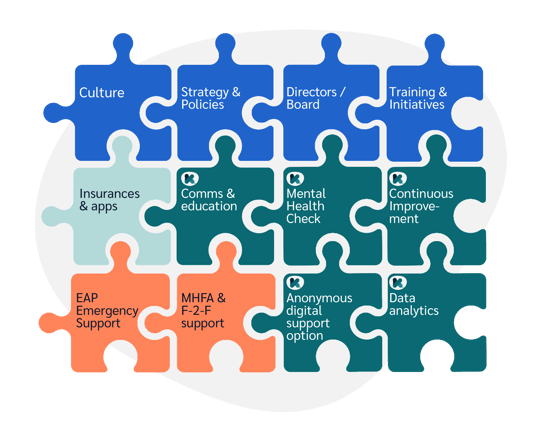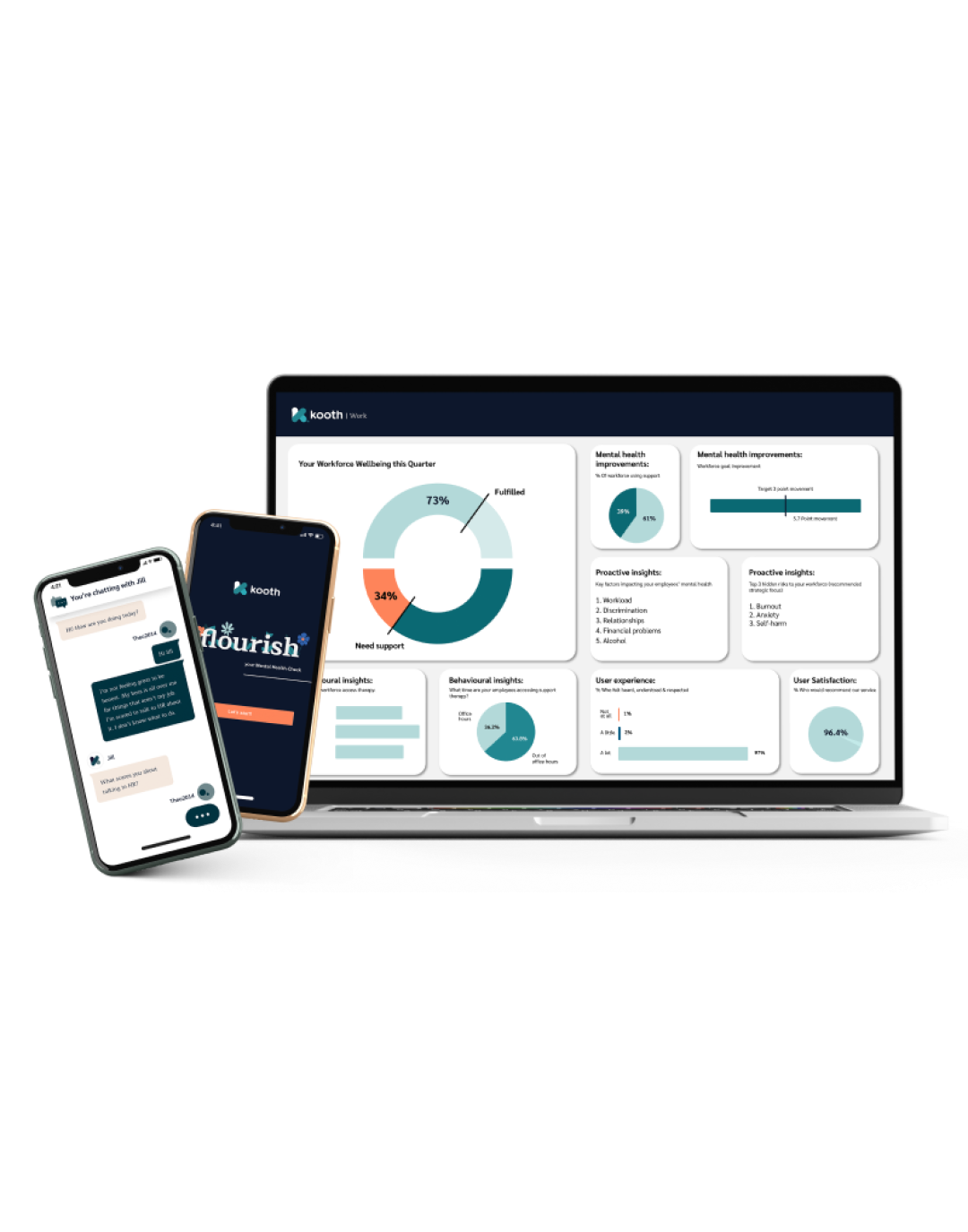When you’re responsible for running a school or a multi-academy trust, setting up a mental health support system may not currently be near the top of your agenda. But maybe it should be.
Anyone who works in education understands that teachers and other staff in schools have been stretched to breaking point during the pandemic. They have dealt with constant uncertainty and countless challenges, from dealing with remote working and exam changes to concerns about keeping children safe. All while juggling their own home lives as well.
Teachers under pressure
Many teachers are burnt out. The 2021 Teacher Wellbeing Index for example, found that 77% of teachers and education staff had experienced symptoms of poor mental health due to their work. Among this group, the most common work-related issues included work-life balance, excessive workload and the COVID-19 pandemic.
Most worryingly, 11% of those who had experienced symptoms of poor mental health due to work reported that they had felt suicidal.
1 in 10
The repercussions of pandemic stress continue to ripple through the education system across the UK. Schools – and staff - have just had to keep going. Meanwhile, an increase in sickness and absenteeism has piled more pressure on the staff who remain. If your school then fails to meet its performance standards, that adds a whole new level of stress for everyone involved.
Even prior to the pandemic, UK teachers’ likelihood of experiencing depression, stress and anxiety was ‘significantly higher’ than other professionals (Health and Safety Executive). The problem is particularly pronounced in England, where teacher sickness has been traced to stress, anxiety and depression, with these being mental health challenges that contribute to teachers having to take over 2 million days of absence every year (Department for Education, 2018).
How a mental health support system can help
Against this background, the issue of wellbeing and mental health in education is gaining prominence, making it increasingly important to have an effective mental health support system in place.
This can help you look after the mental health and wellbeing of teachers and other staff, which will, in turn, help them to look after the children in their care.
“It’s like the safety announcement when you’re on a plane,” says James Murray, Director of Kooth Work, which provides mental health solutions for a number of academy trusts. “You have to put on your own oxygen mask first before you help someone else. Education staff can only look after their pupils if they themselves are in a good place mentally.”

An ecosystem of support goes beyond having and EAP and Mental Health First Aiders. It requires consideration of leadership, development of strategies, a wide range of support options to support different needs and means to report and continually improve.
Why should education leaders take note?
Another key driver is the need for leaders in education to demonstrate that they are taking action to look after the mental health and wellbeing of teachers and other staff.
Employers already have a legal duty to protect the health, safety and welfare of their employees. But now, Ofsted’s new Education Inspection Framework now has a sharper focus on wellbeing, requiring education leaders to ensure they are proactively addressing issues that may add stress to teachers’ working lives.
Supports key workers with their mental health
Following on from this, the government is encouraging schools to sign up to the Education staff wellbeing charter. This was created by the education sector as a way to protect, promote and enhance the wellbeing and mental health of everyone working in state education. It helps schools to prioritise staff mental health, give staff the support they need and provide managers with access to tools and resources to support the wellbeing of the people they manage.
Helps attracts Generation Z teachers
Better mental health support systems aren’t just good for existing staff; they’re vital for attracting and retaining the best new people. “Young people from Generation Z are often much more comfortable talking about their mental health than older generations,” says James.
“They expect more, too, in terms of the kind of mental health support they get from their employer. They want help to achieve a good level of work/life balance and they want support when they’re under stress. They’re looking for a workplace that has wellbeing in its DNA, rather than viewing it as a ‘nice to have’ extra.”
Provides support before resorting to an EAP
Many schools and multi-trust academies will have an Employee Assistance Programme (EAP) that offers face-to-face counselling, but this has its limitations.
“It’s good to offer your staff in-person counselling,” says James. “However, this will only appeal to 2-5% of people because of the hurdles they have to jump to prove that they qualify.
“They might have to answer 50-60 questions about anxiety, depression, and alcohol and drug use. People can be understandably reluctant to talk about such personal issues. And if they do go through that process and qualify, they might only receive a few sessions at specific times each week that may not fit with their schedule.
“The vast majority of people are left suffering and struggling, thinking there’s nothing available for them. They may not feel bad enough to go to their GP, but they’re too ill for something like mindfulness to have any impact.”
What does a good mental health system look like?
Through its engagements across the education sector, Kooth Work has created a mental health and wellbeing support platform and playbook that is tailored to the needs of teachers and education staff. It works alongside (or instead of) existing Employee Assistance Programmes and is based on six key features:
1. Identifying indicators of poor mental health
Kooth Work coaches teachers and education staff to identify signs that they (or other staff members) may need mental health support, while also enabling leaders to understand broader trends, identify risks and develop a plan to mitigate those risks.
Kooth Work offers the Flourish Mental Health Check that helps respondents to:
- Understand the current state of their mental health and wellbeing
- Receive immediate guidance, expertise and support, if needed
- Develop a support plan that will help them flourish.
Reporting and KPIs
Education leaders also receive an aggregated report so they can understand the mental health of their staff across their academy trust, university education organisation, where the risks exist across it and take effective action. As part of this service, Kooth Work offers quarterly coaching to education leaders so they can analyse how best to approach the prevailing issues.
“For example, if the anonymised data shows a rise in the number of staff who are reporting problems with caring for family members, we might offer advice on running a dedicated webinar session on how to cope with the stress of being a carer,” says James.
As an employer you can use Key Performance Indicators (KPIs) to help track the status of your workforce mental health. For example it is common to track outcome metrics such as absenteeism rates, leavers and usage of your EAP for emergency support. These show you what has already happened. If you are looking to focus on improving support and prevention, then it would be worth considering proactive and predictive KPIs and reporting that help you identify issues early. For example risk of burnout (Copenhagen Burnout Index) and depression (WHO-5), and more qualitative areas such as tracking 'presenting issues'.
2. Creating a psychologically safe workplace
A psychologically safe space is one where people feel free to express their concerns. In this context, it means that employees don’t feel threatened by other people knowing that they’re seeking support for their anxieties and mental health problems.
You can achieve this by putting employees’ mental health and wellbeing at the centre of your organisation’s values, by clearly signposting support, and making it easy for people to access and use the support that’s on offer. Murray points to the importance of normalising daily mental health support,“Mental health care is often what people reach for when things have become desperate. Our service is more akin to a mental health gym where people proactively manage their health”, adding “another key worker client, West Midlands Ambulance Service, uses the phrase, ‘PPE for the Mind’”.
3. Providing anonymous support options
“People can be worried that it will impact their career if they ask for help with mental health concerns,” says James. “At Kooth Work, we offer an anonymous, BACP accredited service that allows people to chat via text openly and confidentially with mental health professionals. There are no checks to see who has asked for support. There’s no need to download an app. Giving people the freedom to explore their issues without prejudice is at the heart of the service.”
4. Supporting 24/7 at the front line and at home
Teachers and education staff have exceptionally busy schedules. An effective mental health support system will offer them the opportunity to choose when and how they access the support they need - whether that’s during a tea break, at the end of the day or at 3am.
With Kooth Work, there are no referrals or waiting lists. The service is there when people need it, 24/7, accessible from any device.
5. Choice and self-therapy
Kooth Work allows people to choose how they want to access help, through psychologically safe forums, self-therapy, and live one-on-one counselling with a professional via their mobile device.
“People want access on their own terms. One day they may want to read self-help articles, chat with peers online or receive light touch support through our online messaging service,” says James.
“On other occasions they may need more structured support to cope with a life-event and for that, we have 250 BACP accredited counsellors on hand who are ready to help teachers cope with what has happened and build their resilience for the future.”
6. Continually improving staff mental health
The final step for an effective mental health and wellbeing system is learning from the past to ensure continuous improvement. Kooth Work collects anonymised data that summarises the mental health challenges people are experiencing, highlighting presenting issues such as stress, anxiety or depression.
Whereas our health check service provides a snap-shot in time, our ongoing reporting enables leaders to see an aggregated view of the goals set as well as progress towards these and adapt plans as required.
When should you act?
“Teachers and education staff already have to deal with the same issues we all face, such as family issues, health concerns and financial worries,” says James. “Bring that together with unhappy children and the Covid crisis and things start to boil over.
“Now, more than ever, schools need to realise that teachers are approaching burnout. The time to act is today.”
Discover Kooth Work
Get started with Kooth Work.
Understand. Support. Improve.






